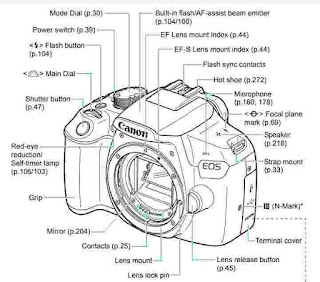Canon EOS 1300D Manual
 |
| Canon EOS 1300D Manual |
Recommended for download Canon PowerShot SX740 HS Manual
The EOS 1300D is reliable, handy and, despite its complexity, very easy to operate. It offers many of the same features found in Canon's professional DSLRs. Although it has a lot in common with its 1200D predecessor (e.g. plastic body, switch layout), it has been improved for key features. Of particular interest in this context is the current DIGIC 4+ image processing processor, which is much faster than the 1200D. The sensor is just as large with an identical resolution of 18 megapixels. It works with 14-bit color depth, which gives much more freedom in exposure compared to older sensors and cameras. The resolution for videos is a state of the art. The EOS 1300D records video material in full HD resolution with 1,920 × 1,080 pixels at a maximum of 30 fps (frames per second). Those who like slow motion have to switch to the lower resolution of 720p at a maximum of 60 fps.
The switch layout of the 1300D has practically not been changed, only a small light has been added at the bottom right of the back panel to indicate Wi-Fi activity. If you've worked with another Canon camera before, you'll probably get used to the 1300D's operating concept after a short training period and can use it perfectly after just a few hours. Canon has come onto the market with the EOS 1300D in the usual model change cycle and at the right time. If you look at the technical data in a very sober way, the new addition to the EOS family offers excellent and familiar features, starting with the 18-megapixel sensor in APS-C format. The technology of the EOS 1300D is already largely known from other cameras. The autofocus system with its nine focus points, the middle of which is designed as a particularly sensitive cross sensor, has been known for several camera generations. The EOS 1300D also offers the AF modes AI FOCUS, ONE SHOT and AI SERVO that have been common for years. The camera supports both automatic and manual focusing with illuminated focus marks in the viewfinder. The nine AF points can be selected automatically or individually for focusing.
Canon EOS 1300D specifications
| Image Sensor |
Type: Approx. 22.3 mm x 14.9 mm
Effective Pixels: Approx. 18.0 megapixels
Total Pixels: Approx. 18.7 megapixels
Aspect Ratio: 3:2
Low-Pass Filter: Built-in/Fixed
Sensor Cleaning: Manual cleaning and Dust Delete Data acquisition
Colour Filter Type: Primary Colour
|
|---|---|
| Image Processor | Type: DIGIC 4+ |
| Lens | Lens Mount: EF/EF-S Focal Length: Equivalent to 1.6x the focal length of the lens |
| Focusing |
Type: TTL-CT-SIR with a CMOS sensor
AF System/ Points: 9 AF points (f/5.6 cross type at center)
AF working range: Centre AF point: EV 0 -18 (at 23°C & ISO100). Other AF points: EV 1 -18 (at 23°C & ISO100).
AF Modes: AI Focus - One Shot - AI Servo.
AF Point Selection: Automatic selection, Manual selection.
Selected AF point display: Superimposed in viewfinder and indicated on LCD monitor.
Predictive AF: Yes, up to 10m.
AF Lock: Locked when the shutter button is pressed half way in One Shot AF mode.
AF Assist Beam: Intermittent firing of built-in flash or emitted by optional dedicated Speedlite.
Manual Focus: Selected on lens.
|
| Expsure Control |
Metering modes: TTL full aperture metering with 63-zone SPC. (1) Evaluative metering (linked to all AF points) (2) Partial metering at center (approx. 10% of viewfinder) (3) Center weighted average metering.
Metering Range: EV 1-20 (at 23°C with 50mm f/1.4 lens ISO100).
AE Lock: Auto: In 1-shot AF mode with evaluative metering exposure is locked when the focus is achieved. Manual: By AE lock button in creative zone modes.
Exposure Compensation:+/-5 EV in 1/3 or 1/2 stop increments (can be combined with AEB).
AEB:3 shots +/- 2 EV, 1/2 or 1/3-stop increments.
ISO Sensitivity: AUTO (100-6400), 100-6400 in 1-stop increments. ISO can be expanded to H: 12800. During Movie shooting: Auto (100-6400), 100-6400 (Whole stop increments)
|
| Shutter |
Type: Electronically-controlled focal-plane shutter, with an electronic first curtain.
Speed: 30-1/4000 sec (1/2 or 1/3 stop increments), Bulb (Total shutter speed range. Available range varies by shooting mode).
|
| Viewfinder |
Type: Pentamirror.
Coverage (Vertical/Horizontal): Approx. 95%.
Magnification: Approx. 0.80x¹.
Eyepoint: Approx. 21mm (from eyepiece lens center).
Dioptre Correction: -2.5 to +0.5 m⁻¹ (dioptre).
Focusing Screen: Fixed.
Mirror: Quick-return half mirror (Transmission: reflection ratio of 40:60, no mirror cut-off with EF600mm f/4 or shorter).
The depth of field preview: Yes, assigned to SET button with C.Fn-9-4.
Eyepiece shutter: On strap.
|
| LCD Monitor |
Type:7.5cm (3.0") TFT, approx. 920k dots.
Coverage: Approx. 100%.
Viewing Angle (horizontally/vertically): Approx 170.
Brightness Adjustment: Adjustable to one of seven levels.
Display Options:(1) Quick Control Screen. (2) Camera settings.
|
| Flash |
Built-in Flash GN (ISO 100, meters): 9.2.
Built-in Flash Coverage: up to 17mm focal length (35mm equivalent: 27mm).
Built-in Flash recycle time: Approx. 2 seconds.
Modes: Auto, Manual Flash On/off.
Red-Eye Reduction: Yes - with red-eye reduction lamp.
X-sync: 1/200sec.
Flash Exposure Compensation: +/- 2EV in 1/2 or 1/3 increments.
Flash Exposure Bracketing: Yes, with compatible External Flash.
Flash Exposure Lock: Yes.
Second Curtain Synchronisation: Yes.
HotShoe/ PC terminal:Yes/No.
External Flash Compatibility: E-TTL II with EX series Speedlites, wireless multi-flash support (with optional accessory).
External Flash Control: via camera menu screen, except for wireless radio flash shooting settings.
|
| Physical Specification |
Body Materials: Carbon fiber/glass fiber and polycarbonate resin.
Operating Environment: 0 – 40 °C, 85% or less humidity.
Dimensions (WxHxD): 129.0 x 101.3 x 77.6mm.
Weight (body only): Approx. 485g (CIPA testing standard, including battery and memory card).
|
0 Response to "Canon EOS 1300D Manual"
Post a Comment